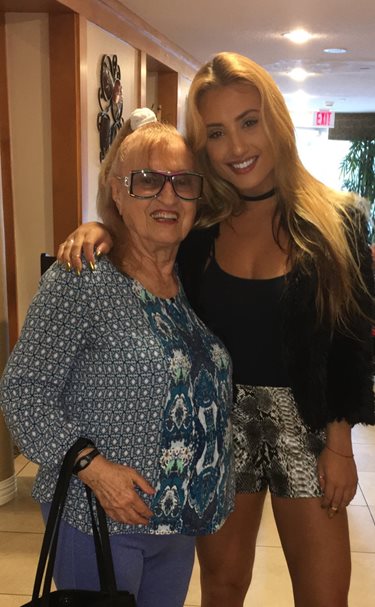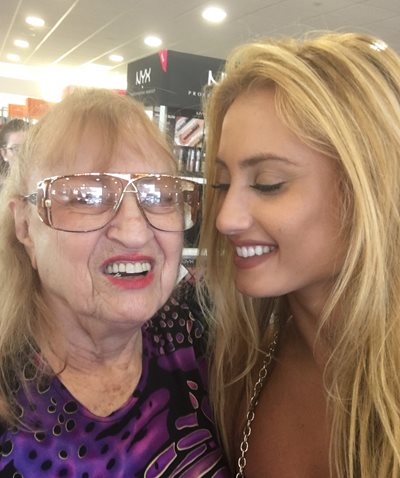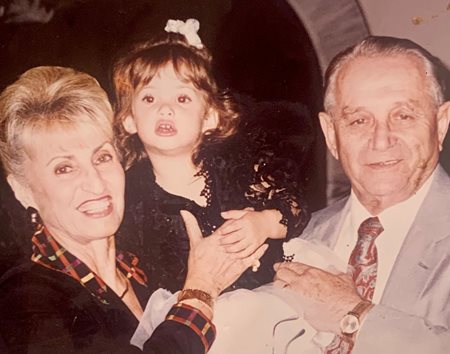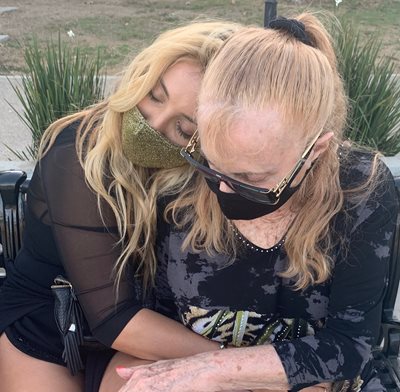
Triple Your Impact This Holiday Season
Triple Your Impact This Holiday Season
Celebrate the holidays with a year-end gift that can go 3x as far to help provide care and support to the millions affected by Alzheimer's disease, and to advance critical research. But please hurry — this 3x Match Challenge ends soon.
Donate NowEntertainer & Millennial Caregiver Montana Tucker Shares Her Alzheimer’s Story & Tells Others: “You Are Not Alone”
Montana Tucker is a singer, songwriter, dancer, actress and social media influencer. Her grandmother, Lilly, a Holocaust survivor, is living with Alzheimer’s.
Montana, what signs of Alzheimer's did your family first notice in your grandma?
I was in California with my mom at the time. We would speak to my grandma, who lives in Florida, daily. One morning, my mom called her, and my grandma suddenly started crying; she couldn't balance her checkbook and was very confused. I got on the phone and told her that we would be coming there and not to worry. We left for Florida the next day.
My grandma has always been very smart, very sharp, very on top of everything — she took care of everything for everyone. Now all her files were a mess. We knew something was very wrong, and my mom was worried that it was the onset of Alzheimer's.
 Then things got worse. Grandma called us in tears, saying she couldn't remember what vitamins to take. The same vitamins she'd been taking daily for as long as I can remember. Here was this strong, independent woman hysterically crying, saying, "I can't remember what I'm supposed to do right now." Grandma knew something was wrong with her, and when my mom realized there was a problem, she took my grandma to the doctor immediately.
Then things got worse. Grandma called us in tears, saying she couldn't remember what vitamins to take. The same vitamins she'd been taking daily for as long as I can remember. Here was this strong, independent woman hysterically crying, saying, "I can't remember what I'm supposed to do right now." Grandma knew something was wrong with her, and when my mom realized there was a problem, she took my grandma to the doctor immediately.
When we took Grandma to a psychologist to evaluate her memory, the test came back low on areas that showed onset of memory loss, and suggested we take her to a geriatric psychiatrist for further testing. My mom found Dr. Marc Agronin at Miami Health Systems. It was 12 years ago that my grandma was diagnosed with Alzheimer's, which Dr. Agronin and a neurologist both confirmed.
I have learned how important it is to be aware of early signs of memory loss. If you have a loved one that you suspect might have early signs of Alzheimer's, PLEASE seek help. As a grandchild of a grandma with Alzheimer's, I know that it's important that my generation supports organizations like the Alzheimer’s Association, who fund research in hopes of finding a cure for this devastating disease. Seeing these signs in someone who has always been so healthy was such a drastic change. My grandma has always kept her physical body so healthy, but we were unable to see what she was dealing with in her mind.
Tell us about your grandma and what you love most about her.
My entire life, my grandma has been the strongest, smartest, sharpest, most beautiful woman. People always used to ask me where I got my dancing skills from, and I would say that I wasn't sure; no one in my family dances. I had forgotten that my grandma used to love line dancing! She would attend line dancing classes three times a week before being diagnosed with Alzheimer's in 2009.
Although line dancing is different from the type of dancing I do, I think that's where I got my skills from. My grandma not only danced three times a week, but she also would enter 10k races, 6.2 miles, and win first place for her age group every time! Even I had a hard time keeping up with her. I would always tell my mom: “I hope I am just like my Grandma when I am her age.” Even today, she still is the strongest person I know.
 Over the past few years, I've gotten more involved in learning about Alzheimer's and how to best care for her. I've talked to others who've said their grandparents or parents with Alzheimer's were often really angry, sad, or always crying. The disease works in different ways in different people, and I know how lucky my family is because my grandma is still so positive and full of life. She's happy to see you, even if she doesn't know who you are. She still makes everyone she encounters feel good.
Over the past few years, I've gotten more involved in learning about Alzheimer's and how to best care for her. I've talked to others who've said their grandparents or parents with Alzheimer's were often really angry, sad, or always crying. The disease works in different ways in different people, and I know how lucky my family is because my grandma is still so positive and full of life. She's happy to see you, even if she doesn't know who you are. She still makes everyone she encounters feel good.
I love taking her for walks along the beach and around the community where she lives, and she never fails to say greet everyone and tell them how beautiful they look. The staff always tell me she is the most loving and happiest person around, and I contribute a lot to having great caregivers. Grandma has the BEST caregivers in the world, but one in particular, Alissya, has been by her side for 10 years. Her being there is such a comfort to me and my mom, and she assures us that my grandma is being cared for with love! Grandma’s caregiving aides treat her like she's their grandma, and Alissya is like my second sister and my mom's second daughter: a part of the family.
Regardless of how Alzheimer's disease may affect my grandma going forward, she's always going to be incredible. She has shown her strength as a Holocaust survivor of Auschwitz, watching her parents killed right in front of her. Despite going through such terrible things in her life, she is still so strong, fighting this disease. I'm so proud of her. She is a true survivor and NEVER GIVES UP.
As a millennial caregiver, what are the challenges and emotions you have faced?
One of the hardest things is hearing my grandma say, "I love you," wondering if she knows I am her granddaughter who loves her more! So many people throw that phrase around or say it in a quick, automatic way. But when I say "I love you" to my grandma, she will stare at me intently, and I know she feels it — she just can't always say it back. You don't realize how powerful those words are until someone is unable to say them. Sometimes she'll just look and smile. But there are other days when she'll say, "I love you, too" or "I love you more." Oh my gosh: it's just the greatest moment!
 My Grandpa Zadie passed away two years ago at age 97, and I'm so thankful that I documented moments with him and my grandma together. To this day, she still doesn't know he has passed, even though they were married for 68 loving years. It brings me joy to continue to capture special moments with her and relive beautiful memories through old videos and pictures of her and my grandpa.
My Grandpa Zadie passed away two years ago at age 97, and I'm so thankful that I documented moments with him and my grandma together. To this day, she still doesn't know he has passed, even though they were married for 68 loving years. It brings me joy to continue to capture special moments with her and relive beautiful memories through old videos and pictures of her and my grandpa.
Today, my grandma doesn't know my name, but I feel like she knows who I am. She does know my mom's name, which is really incredible. And my mom and I look alike, so sometimes she thinks I'm my mom, or she'll get confused when she sees us together and makes a joke about us looking alike.
I come to visit as much as possible, and when I'm there, I spend every moment I can with her. That's what keeps us going, knowing we are needed. My mom will take a walk on the beach to decompress and care for her own heart and mind, which helps keep her sane throughout this journey.
We have also found healing through dance, and I always document my grandma getting into the music on my Instagram stories. She will start humming random songs that she recalls from her past, then begins to dance, and springs to life when music comes on. It is magical.
It's crazy, the circle of life. You're born, your parents care for you, and then years later, it flips entirely on its head. I am proud and lucky to speak out about this as a grandchild, and I hope other grandchildren will speak out and be involved in their grandparents' lives if they can because it can do so much good.
What advice do you wish you had prior to your grandmother’s diagnosis?
Her progression in the disease has been slow, and now, 12 years down the line, my family has been lucky to have her be as engaged as she has been. But I do see some progression each time I come home; I have learned that things can change quickly, and that Alzheimer’s is unpredictable. Thankfully, my mom is so on top of everything, and she's been like this my entire life; she doesn’t let anything slide by! That is so helpful when recognizing the signs and symptoms of Alzheimer’s. My mom took action very quickly after we saw changes. An early diagnosis can make all the difference on your journey with this disease. That is my best advice — do not ignore the signs or symptoms.
My mom being so proactive is the reason my grandma is comfortable and cared for today. They are both the toughest women I know, and I want to give my mom kudos for everything she does. When I started working in the entertainment industry at age 8, she didn't want me to do it; she wanted me to have a normal childhood. As I pressed her, she told me that there will be sacrifices we would have to make along the way. So, when I would miss a friend's birthday party or couldn’t go to my school prom because I was working, my mom was strict, since I had chosen this path. As a teenager, of course, I would be upset with her! But when I turned 18, I became so incredibly thankful for how she raised me. Her strength is why my grandma has the best life possible. She fights for everything for my grandma and fought for my grandpa. It’s my hope that everyone has an advocate like my mom.
How do you use your platform to draw awareness to the Alzheimer’s cause?
Every time I see my grandma, I post moments from our visits together on social media. These are snippets from our lives that are raw and authentic, and people who have watched these glimpses into her life are so supportive, sharing how they relate to my experience as a millennial caregiver.
 I made a TikTok video of my grandma during the pandemic, me driving by to see her at her care home, with our masks on. It was sad, her reaching out, trying to hold my hand, but my people related to that, too. TikTok and Instagram have connected me with my audience on new levels. So many people write to me and thank me for sharing my story, and some of them share that they are dealing with the same thing. It’s incredible to have that sense of community.
I made a TikTok video of my grandma during the pandemic, me driving by to see her at her care home, with our masks on. It was sad, her reaching out, trying to hold my hand, but my people related to that, too. TikTok and Instagram have connected me with my audience on new levels. So many people write to me and thank me for sharing my story, and some of them share that they are dealing with the same thing. It’s incredible to have that sense of community.
You have worked with some of the biggest names in music. How do you hope your music will inspire others?
The lyrics of my song “I’m Not Alone” are so important in the times we are living through. The COVID-19 pandemic has been hard for people with loved ones living in care homes in particular, unable to connect in the ways they used to. I had to go so long without seeing my grandma, as I quarantined in Florida. Then for months and months, I had to visit from the car and not be able to touch her. It’s terrible. And I know how hard it was for my mom, because she's used to seeing her every single day.
The lyrics of my song communicate that you aren’t alone, no matter what you're going through. So many people are facing difficult times, and I hope the song makes people stay positive. During the pandemic, I have gone to my grandma’s care home, blasting music from boomboxes for the residents to hear. We had a dance party, with residents moving to the music on their balconies. I try to do whatever I can to make things feel better!
What advice do you have for other families facing Alzheimer’s disease?
Keep visiting people with the disease, sticking to the safety protocols in place, and ensure that they're receiving the best care possible. My grandma is so blessed to have people around her that love her so much, but not everyone has that support around them. Looking into the care the person with the disease is receiving is crucial.
And you can’t give up! My grandma is still doing well physically, and we try to keep her engaged mentally. I truly believe she would not be doing as well if we were not there for her every day. We can’t understand what a person with Alzheimer’s is thinking, but we live for those moments when they come out of a haze and remember us. Those moments are so powerful, and you never know when that moment is going to happen. Make sure that you are there for those moments when you can be.
Alzheimer’s is a very serious disease, but we can all look for the moments of joy on the harder days. When I am 92, my grandma’s age, I hope I am as happy, as loved and as loving as she is. She has faced so much in her life, and still exudes so much joy. She is truly 92 years young!
 My family is hoping for a cure that can help my generation, and the people who come after me. I have a platform for making positive change and for spreading Alzheimer’s awareness to the teenagers and young kids who follow me. When I share my passion, I hope I can inspire others to tell their stories, too.
My family is hoping for a cure that can help my generation, and the people who come after me. I have a platform for making positive change and for spreading Alzheimer’s awareness to the teenagers and young kids who follow me. When I share my passion, I hope I can inspire others to tell their stories, too.
I have had so many people say to me… “Montana, why do you go see your grandma so much, if she doesn’t even remember who you are?” My answer is ALWAYS the same: “Because I remember who SHE is.”
About: Montana Tucker lives in Los Angeles. In addition to spreading Alzheimer’s awareness on her social media platforms and participating in the Walk to End Alzheimer’s, she is also involved in initiatives that help feed the homeless population in L.A. and support anti-bullying. You can follow her on Instagram and TikTok.
Related articles:
Get Involved
Music and Alzheimer's
